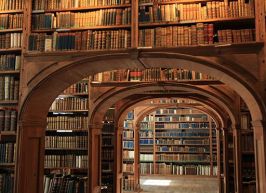
In Search of Lost Time
- Novel
- Modernism
What It’s About
“Life is too short, and Proust is too long,” wrote Anatole France in 1913 after the publication of In Search of Lost Time’s first volume – at a time when the remaining six volumes weren’t even on the horizon. Nobody, not even the author himself, had the slightest idea what the agonizing, drawn-out search for the meaning and essence of art would spawn: a literary universe that tackled or anticipated nearly all the philosophical and psychological questions of his time. The novel deals with the subjective nature of experiencing reality; with the power of the unconscious; and with love, jealousy, sickness, war, homosexuality, pederasty, the transience of life, and death – or merely the creative potency of a childhood memory. Proust remains unmatched in the obsession and attention to detail with which he illuminated every single aspect of human existence. This makes for a lengthy voyage, and you are likely to run out of steam at times. But to dive deeply into Proust’s universe is well worth your effort – and certainly not time lost.
Summary
About the Author
Marcel Proust was born on July 10, 1871, in Auteuil near Paris. His father was a famous physician; the mother descended from a wealthy Jewish banking family. Starting in 1878, Proust spent his holidays in the village Illiers near Chartre, the model for the fictional Combray. In 1881, Proust suffered his first asthma attack. The following year, he attended the Lycée Condorcet, where he published a number of literary journals with his schoolmates. After graduating from high school and despite his poor health, he served in the French army for a year in Orléans. After that, he began to study politics and law, yet dropped out of the program and graduated from university with a degree in philosophy and literature. In order to appease his father, he accepted a volunteer position as a librarian in 1896 but obtained sick leave before really starting to work. His seemingly idle life, excellent connections to aristocratic circles as well as to the most fashionable salons in Paris gave him a reputation for being a snob and social climber. The author struggled with his homosexuality all his life, something his father tried to drive out of him in his youth by taking him to a brothel. Proust had a number of lovers but remained closeted. In 1896, his first book Les plaisirs et les jours (Pleasures and Days), a collection of short stories, was published, and he fought a duel with a critic who made disparaging remarks about it. In 1903, Proust’s father passed away and two years later, his beloved mother. Proust inherited a fortune that allowed him to live in luxury, but his health continued to deteriorate. He retired more and more into the bedroom of his Paris apartment to toil away on his life’s work, À la recherche du temps perdu (In Search of Lost Time), publishing the first of seven volumes at his own cost and even paying the leading newspapers of the time to publish favorable reviews of it. Marcel Proust died of pneumonia on November 18, 1922. His brother published the last three volumes posthumously in 1927.










Comment on this summary